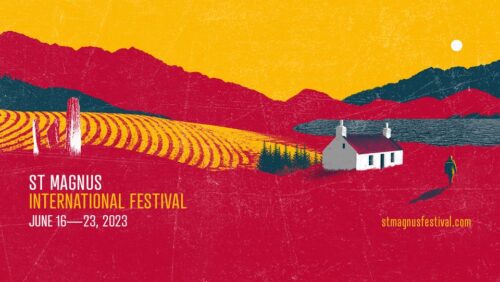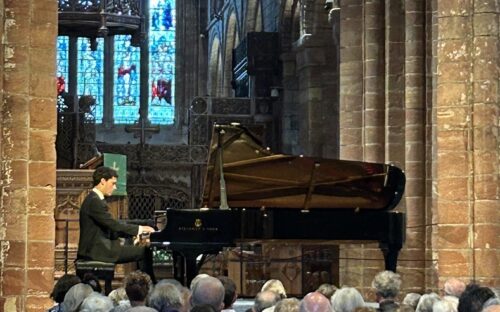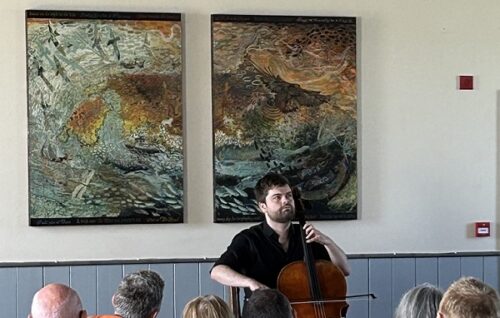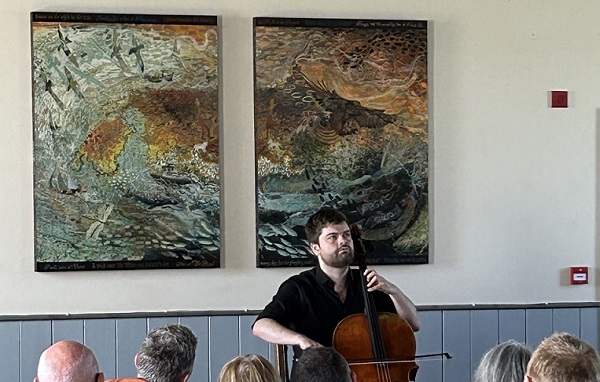
 United Kingdom St Magnus Festival 2023 [1]: (ST)
United Kingdom St Magnus Festival 2023 [1]: (ST)

Florilegium – St Magnus Cathedral, Kirkwall, 16.6.2023.
Leclair – Deuxieme Recreation de musique
De Visée – Suite for theorbo
Couperin – Francoise Sonate
Marais – Suite for viol
Rameau – Piece de clavecin en concert No.5
Rebel – Caracters de la danse
Findlay Spence (cello) – Scapa Flow Museum and Hoy Kirk, Hoy, 17.6.2023.
Works for solo cello by Bach, Berio, Boyle, Beamish, Britten and Silvestrov
Nikola Meeuwsen (piano) – St Magnus Cathedral, Kirkwall, 17.6.2023.
J.S. Bach – French suite No.6, BWV 817
Bach/Busoni – Nun komm der heiden heiland, Ich ruf zu dir
Mozart – Sonata No.4 in E-flat, K. 282
Ravel – Le Tombeau de Couperin
To some extent or other, a sense of place is important to every festival. Some make more of it than others, but it’s always there. The Royal Albert Hall is undeniably the home of the BBC Proms, Salzburg’s festivals get a boost from it being the birthplace of Mozart, and Edinburgh makes the most of its Royal Mile and Castle every August. Sometimes, however, that sense of place becomes more palpable, and more valuable, when you get away from the hustle and bustle. The rolling fields of East Lothian add pastoral beauty to the music of the Lammermuir Festival, and the beaches of eastern Fife make the East Neuk Festival feel like a tiny musical paradise on its own little spit of coastline.
Place is at the very centre of what makes Orkney’s St Magnus Festival special. The festival was founded by Sir Peter Maxwell Davies in 1977. Composer, Master of the Queen’s Music, and longstanding Orkney resident, Max (as he was known) had long wanted to give something back to the community of Orkney for giving him the peaceful haven he so needed, and so the festival was planned around the longest day of the year when, this far north, it stays light for all but a few hours. It has been going strong for decades now, though this was my first visit. Naturally, its location makes it harder than most to get to, but it is also central to the festival’s appeal. Aside from the music and drama that is going on across the archipelago, it is the sense of place that hits you and makes the St Magnus Festival feel really unique.
The festival’s sense of place is felt most triumphantly in its central venue, the great cathedral of St Magnus, whose faded sandstone bulk has stood guard over central Kirkwall for nearly eight centuries. Its soaring gothic interior is a fantastic place to hear music, ranging from the intimate to the grand.
Starting with the intimate, the six virtuoso soloists of Florilegium played French Baroque music from the court of King Louis XIV on eighteen-century instruments and with impeccable élan. They danced and weaved their way through music of courtly refinement with casual insouciance. Highlights included Ashley Solomon’s quicksilver flute, that could dance with as much elegance as it could sigh, and Reiko Ichise’s viola da gamba whose tone could switch in the space of one phrase from chalky friction to chocolaty beauty. Music of the French Baroque, particularly when it is written for the court, can sometimes sound like an excess of refinement, but they remedied that with a suite of dance movements by Jean-Féry Rebel that acted like a punchy compendium of styles and ended their performance with a bang.
The following evening the cathedral hosted a solo piano recital from the hugely promising young Dutch pianist Nikola Meeuwsen. The huge space seemed to cushion the sound and bring it gently up to the ear, and Meeuwsen’s delicate technique gave it a magical feeling of luminescence. That was most evident in his rippling, glittering performance of Ravel’s Le Tombeau de Couperin which, considering that Ravel wrote it as a memorial to friends he had lost in the First World War, seemed to make a virtue of its evanescent beauty. Bach’s French Suite No.6 seemed to sparkle in mid-air, while the Busoni transcriptions sounded serious but never heavy, and the slow movement of Mozart’s Piano Sonata No.4 had a gorgeous sense of lyrical flow.

But the festival’s sense of place was even more palpable on Saturday on an excursion that combined some wonderful cello playing with a visit to Hoy, the island where Max made his Orkney home for so long. It is an extra ferry ride from the Orkney mainland, and the remoteness is reinforced when you drive around it on a single-track road, past occasional houses and salmon farms, but with very few other signs of life.
For several decades in the first half of the twentieth century, however, the tiny hamlet of Lyness must have felt like the centre of the world when it was pressed into war service on behalf of the Royal Navy’s Grand Fleet. The east coast of Hoy sits on the edge of Scapa Flow, a protected natural harbour that was the perfect place for the fleet to supply and regroup during both World Wars. One of the old buildings has now been converted into the Scapa Flow Museum, and they have done a fantastic job not just of rejuvenating the space but of presenting the story of Scapa Flow’s wartime past in a gripping manner.
The pumproom of the museum, which once served as infrastructure for refuelling the ships in the harbour, really isn’t the sort of place where you can imagine classical music taking place, but cellist Findlay Spence played the first of two concerts on Hoy among its industrial apparatus and the sound was as surprising as it was wonderful. The acoustic of the space fits the cello remarkably well, acting like a soft cocoon around the sound and giving it presence without too much resonance. Spence’s programme of music from Bach’s cello suites, alongside a lullaby by Rory Boyle and Berio’s Les Mots sont Allés, held the audience spellbound, as much by the delicacy of his technique as by the strange colour of the sound. A few hours later he played in isolated Hoy Kirk in a setting that brought more conventional intimacy to the sound; but it’s the performance in the museum that I will remember most because it was so unlikely and so implausible, yet so magical because it took place at all.
Simon Thompson
The St Magnus International Festival runs until 23 June; for more information click here.
